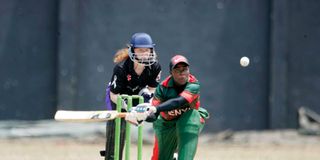Batting for precision and success

Kenya Ladies spinner Queentor Abel bats under pressure from United Kingdom Armed Forces Wicketkeeper Georgie Cant during a match staged on September 26, 2017 at Sikh Union Club.
What you need to know:
- At first, my parents weren’t very supportive because they believed in academics so even getting permission to go for practice or to participate in tournaments was hard. But with time, after I started bringing trophies home, they became more supportive.
- The money I earn from cricket isn’t enough to live on because there are very few cricket tournaments for women, and the pay is little.
- At the moment, I work at a movie shop and that is how I earn my money.
- Queentor Aoko, 24, was Kenya’s top performer in the 2022 Commonwealth cricket.
- She scored 50 runs and picked up four wickets in qualifying matches against Sri Lanka, Bangladesh, Malaysia and Scotland.
- The first born in a family of three has 10 years of experience playing cricket for team Kenya.
- She has also featured for Uganda’s Pioneer cricket club and Aziz Damani Cricket club from Uganda.
- Queentor, who was born and raised in Nakuru, plans to pursue a degree in sports science to boost her sports career.
- She is a right handed batter and spinner who enjoys listening to music, cycling and watching movies during her free time.
1. How did you get into cricket?
I was introduced to the game while at Kisulisuli primary school when the Cricket Without Boundaries charity organisation visited my school. They taught us the importance of keeping fit and staying healthy through sports, and how we could use sports to bring change in our communities. That is when I saw cricket bats and knee pads for the first time and I got curious because I had never known of such a game before. I joined the school team immediately and I loved everything about the game, especially the batting and running to catch up with the ball. However, I only started competing in tournaments when I got to high school.
2. What are some of the challenges you have faced in your journey to pro cricket?
The biggest is lack of public training facilities where I can improve my skills. For example, in Nairobi, we have only three main cricket grounds at the Sikh Union Grounds, Ruaraka Grounds and the Nairobi Club, and all these are privately owned. This makes it hard to prepare for tournaments, meet and interact with qualified coaches. It also discourages many cricket players, especially women, from joining the sport. The second challenge is on getting our fans back. The local game has lost its shine for almost a decade due to wrangling officials and failure to participate in local and international tournaments. This made many players and fans quit the game and we now need to correct that.
3. Was this your dream career? Have your parents always been supportive? From the game, are you earning enough to sustain you?
Cricket was never my dream career. I wanted to study mechanical engineering but while growing up, I realised that the only sports that most children knew and played were football and athletics, so I took up cricket because I wanted to be different. At first, my parents weren’t very supportive because they believed in academics so even getting permission to go for practice or to participate in tournaments was hard. But with time, after I started bringing trophies home, they became more supportive. The money I earn from cricket isn’t enough to live on because there are very few cricket tournaments for women, and the pay is little. At the moment, I work at a movie shop and that is how I earn my money.
4. What is your short term goal? Why do you want to study sports science, how do you think it will boost your career?
I really don’t have a short term goal with regards to the sport. Cricket in Kenya is unpredictable so it is hard to make any plans for the future. If you get selected for a tournament, you are lucky, so you can plan for that. That said, I would be thrilled if I could get a chance to play abroad, perhaps in countries like Bangladesh or India. That is my cricket dream.
This is actually my plan B once I can no longer play actively and become either a coach or an administrator. Knowledge in sports science will boost my career because it will expose me to more job opportunities in the industry. That way, I can sustain myself during retirement and still enjoy cricket.
5. Do you think sports women and men need to go to formal schools or should they just focus on polishing their talent?
School is important. You can’t play throughout your life but if you have academic knowledge you can do anything whether you are old or young. Plus, it will help you interact better with people from different countries in case you go professional.





